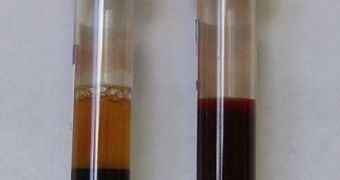Future transfusions made in case of an emergency could use blood that is derived from the patients themselves, eliminating the risks of infections and incompatibilities. A research team managed to develop a way of turning adult skin cells into blood cells.
The blood obtained through this mechanism could have tremendous practical applications in the field of medicine, especially as far as surgeries and cancer treatments go.
According to the Canadian team of scientists that conducted the new work, clinical trials using blood obtained from skin could begin on humans as early as 2012.
Doctors today are in desperate need of blood. There is very little of the stuff in blood banks, barely enough to cover the immediate necessities. People undergoing surgery, those with cancer, and those suffering from diseases such as anemia will therefore have an extra chance if the new technique gets approved.
Details of the research appear in the November 7 issue of the esteemed scientific journal Nature. Oddly enough, the new technique is more efficient at producing blood than creating the stuff by reconverting embryonic stem cells.
One of the main disadvantages of that technique is that it produced embryonic blood cells, that cannot be readily transplanted into adult patients, LiveScience reports.
But the new method “has the major benefit of producing adult-type l blood cells instead of fetal blood cells,” explains US National Institutes of Health (NIH) expert Cynthia Dunbar.
The official is the head of the molecular hematopoiesis section of the NIH National Heart, Lung and Blood Institute (NHLBI). She adds that the new technique is a paradigm shift in blood production.
According to Canadian experts at the McMaster University Stem Cell and Cancer Research Institute, the main breakthrough came when the team found growth factors that could be used for cellular reprogramming.
As another positive consequence, the team determined that it is possible to produce bulk amounts of blood using this technique. The conversion inefficiency associated with other blood production methods is completely circumvented in this approach.
“We'll now go on to work on developing other types of human cell types from skin, as we already have encouraging evidence,” adds the lead study author of the research, expert Mick Bhatia. He is also the scientific director of the Stem Cell and Cancer Research Institute.
The technique works for both adult and infant skin, the team says, which means that new blood could be produced to satisfy the needs of all age groups.

 14 DAY TRIAL //
14 DAY TRIAL //